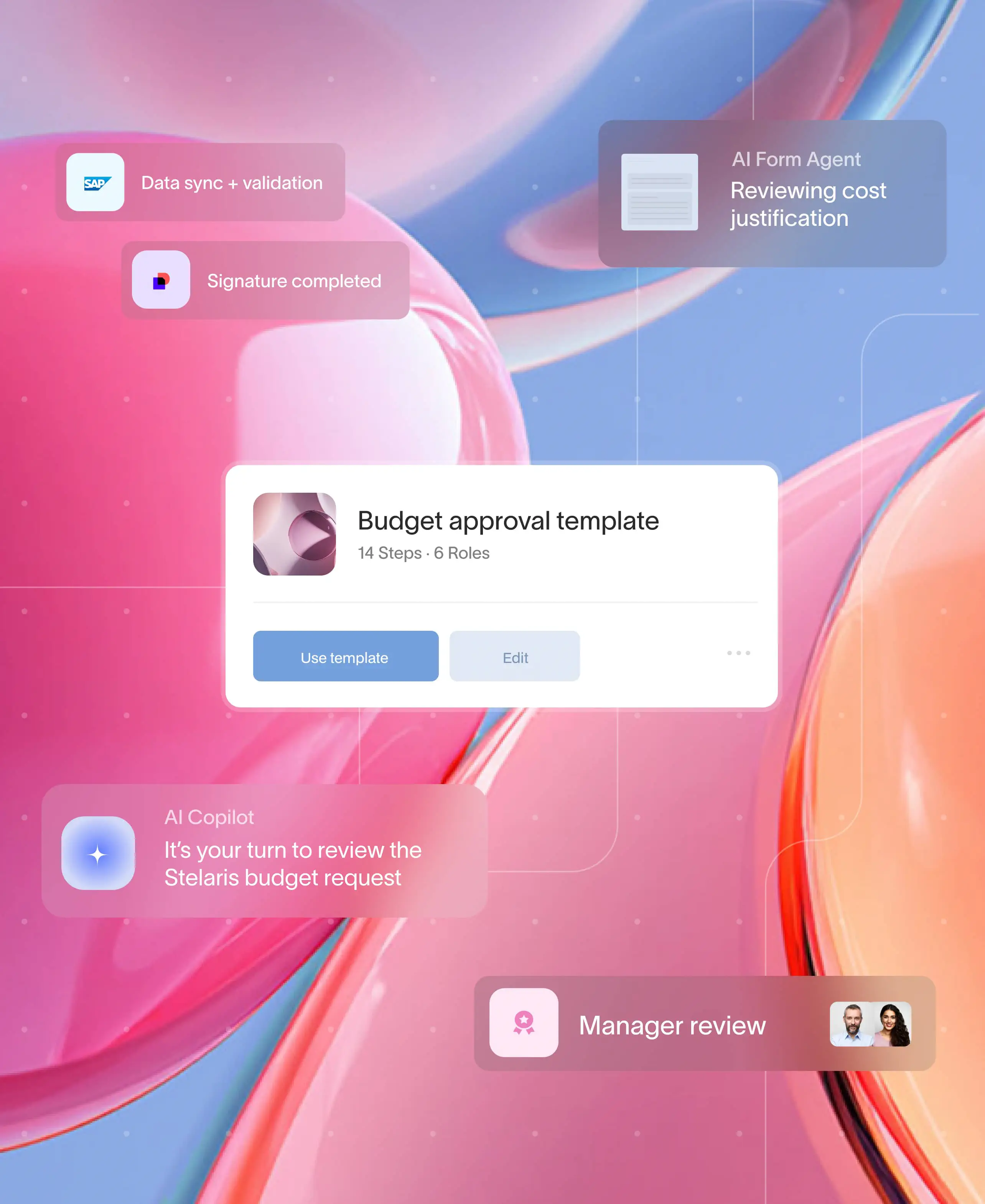
Vendors are an extension of your business. They should be reliable, secure, and compliant. How can a business actually check for these factors? Vendor due diligence isn't just a box to tick—it's a strategic necessity to safeguard your organization against unforeseen risks.
By thoroughly vetting vendors, businesses can mitigate risks, avoid costly disruptions, and ensure they are working with reputable, reliable partners. Understanding vendor due diligence and its effective implementation can save your business time, money, and potential legal issues.
This blog post explores the details of vendor due diligence, providing business owners a comprehensive guide to navigating this critical process. We will delve into what is vendor due diligence, when to assess vendor risks, and the steps involved in the due diligence process.
What is vendor due diligence
Vendor due diligence is the systematic evaluation of a vendor's reliability, capability, and security before entering into or maintaining a business relationship. It involves a thorough examination of the vendor's business practices, financial health, compliance with regulations, and potential risks they may pose to your business.
By conducting vendor due diligence, businesses can identify red flags early, ensure compliance with industry standards, and establish a foundation of trust and transparency. This proactive approach is essential for mitigating risks and making informed decisions.
When to review vendor risk
It is important to note that vendor risk assessments should not be a one-time event. As the business landscape and your organization's needs evolve, so too should your vendor due diligence process.
The frequency at which you should review vendor risk depends on your organization's risk tolerance and the criticality of the vendor. High-risk vendors may require more frequent reviews, while lower-risk vendors may only need to be reviewed annually.
It is crucial to regularly review vendor risk to ensure the integrity and compliance of your business relationships. Here are key scenarios to consider:
- Before entering contracts: Always assess vendor risk prior to signing any contracts or agreements with new vendors. This helps to identify potential pitfalls and ensures that the vendor aligns with your company's values and standards.
- Significant changes in operations: If a vendor undergoes substantial changes to their business operations or organizational structure, it is important to reassess their risk profile. Such changes can affect their ability to deliver services or comply with contractual obligations.
- Regulatory changes: Keep an eye on any changes in regulations that could impact vendor compliance. This ensures that your vendors continue to meet industry standards and legal requirements.
- Identified issues or risks: If any issues or risks arise during your relationship with a vendor, it is essential to conduct a thorough review. Addressing concerns promptly can prevent larger problems down the line.
- After significant incidents: Following any major incidents or breaches related to vendor performance, a comprehensive review is necessary to understand the impact and implement corrective measures to safeguard your organization.
By being vigilant in these scenarios, you can better manage vendor risk and protect your business interests. Incorporating these considerations into your vendor evaluation process will help ensure that you are always aligned with current circumstances and prepared for any new developments.
7 reasons why you should conduct vendor due diligence
Conducting thorough vendor due diligence offers significant advantages for your organization. Here are seven key reasons why it's essential:
- Protects your organization: Vendor due diligence shields your business from potential risks. By carefully evaluating due diligence data, you can make informed decisions and avoid harmful business relationships.
- Safeguards your customers: Risky vendor relationships can expose your customers' sensitive information to breaches. Proper due diligence helps protect both your organization and your customers.
- A strategic tool: Treat vendor due diligence as a strategic initiative, not just a routine task. Use it to strengthen vendor oversight and improve business outcomes.
- Meets regulatory expectations: Industries like finance and healthcare require compliance with vendor due diligence standards. Regulatory bodies expect your diligence efforts to match the risk level and significance of the vendor.
- Establishes a best practice: Even in unregulated sectors, vendor due diligence is a best practice for identifying risks and fostering safer partnerships.
- Uncovers hidden risks: By involving subject matter experts, you can identify overlooked risks within vendor relationships that may threaten your business.
- Identifies poor fits: The process can highlight issues that conflict with your organization's goals, allowing you to choose vendors that better align with your business needs."
Key considerations for vendor risk assessments
When conducting vendor risk assessments, there are several key factors that should be taken into consideration. These include but are not limited to:
- Financial stability and reputation: Financial stability and reputation are crucial when assessing a vendor. Reviewing their financial health provides insight into their ability to meet contractual obligations and deliver quality services while researching their reputation can reveal past issues or red flags that might affect the partnership.
- Compliance with laws and regulations: Vendors should be compliant with all relevant laws, regulations, and industry standards. Failure to do so could result in legal or financial consequences for your organization.
- Quality control process and performance metrics: Quality control processes and performance metrics are essential. Inquire about the vendor's quality assurance methods to ensure consistent, high-quality services or products, and establish clear performance metrics to track progress and measure success, holding the vendor accountable for achieving agreed-upon goals.
- Communication and transparency: Good communication is key to a successful partnership. Make sure the vendor has clear communication channels in place and is transparent with you about their processes, timelines, and any issues that may arise..
- Exit strategy and escalation process: While you hope for a successful partnership, it's crucial to have an exit strategy in case things don't work out, clearly outlined in the contract and discussed with the vendor. Additionally, establish an escalation process to address any issues or conflicts swiftly and efficiently before they escalate into bigger problems.
- Security measures: Data security should be a top priority when working with a vendor. Ensure that they have proper security measures in place to protect your sensitive information.
- On-time delivery: Timely delivery of services or products is crucial for the success of your project. Make sure the vendor has a good track record of meeting deadlines and address any concerns about timeliness before signing the contract.
- Flexibility: It's important to have some flexibility in your project timeline or requirements, as unexpected challenges may arise. Discuss this with the vendor beforehand and ensure that they are willing to work with you to find solutions.
- Training and support – Make sure that the vendor offers adequate training and support for their product or service. This will ensure that your team is equipped with the necessary skills and knowledge to effectively use the vendor's offering.
- Contract terms and renewal: Carefully review all contract terms before signing with a vendor, including pricing, termination clauses, and renewal options. It's important to have a clear understanding of what you are agreeing to in order to avoid any surprises down the line

How to conduct vendor due diligence?
Conducting vendor due diligence is a critical step for organizations seeking to establish strong and reliable partnerships. This process helps ensure that potential vendors meet necessary standards and can deliver quality products or services. By thoroughly evaluating vendors, companies can mitigate risks and make informed decisions that align with their business goals.
So, how do you conduct vendor due diligence? Here are some steps to follow:
- Initial engagement
- Comprehensive vendor due diligence
- Thorough review and analysis
- Risk mitigation strategies
- Ongoing monitoring
1. Initial engagement
Begin the vendor due diligence process by engaging with key vendor contacts and internal stakeholders. Clearly communicate the purpose and importance of the assessment to ensure cooperation and transparency.
2. Comprehensive vendor due diligence questionnaire
Draft a detailed vendor due diligence questionnaire covering compliance, security, and user risks. Include specific questions about data protection measures, regulatory compliance, and previous security incidents. Below is a comprehensive vendor due diligence questionnaire that can help assess potential vendors thoroughly.
- Company Overview: The information required includes the vendor's name, address, and contact information, year established, ownership structure, and key personnel along with their backgrounds.
- Financial Information: The necessary documents include financial statements for the last three years, credit ratings, banking relationships, and an assessment of major financial risks.
- Products and Services: This includes a description of the products and services offered, the pricing structure, and the unique selling propositions.
- Compliance and Regulatory: The evaluation includes the licenses and permits held, compliance with industry standards, and any history of regulatory violations.
- Risk Management: The key components include insurance coverage details, risk assessment procedures, and business continuity plans.
- Operational Capacity: The key factors to consider include production capacity and facilities, supply chain management, and the technology and systems used.
- References and Reputation: Client references, testimonials, case studies, and industry reputation are crucial factors to consider.
- Data Security and Privacy: The discussion includes data protection policies, cybersecurity measures, and the history of data breaches.
- Environmental and Social Responsibility: The focus areas include sustainability practices, community engagement and impact, and employment practices.
- Contractual Terms: The document includes standard contract terms and conditions, payment terms, and termination clauses.
3. Thorough review and analysis
A thorough review of the vendor's responses and supporting documentation is crucial to explore each aspect carefully. This examination should focus on identifying inconsistencies, gaps in information, or potential signs of non-compliance with standards or contractual obligations.
As you assess the vendor's submissions, pay close attention to how their responses align with your expectations and requirements. Look for discrepancies that could indicate a lack of transparency or reliability.
Once you've identified any issues, analyze their significance. Consider the potential impact on your organization, including financial implications, reputational risks, or operational disruptions. Also, evaluate the likelihood of each risk occurring and prioritize them accordingly.
This analysis will help you make informed decisions about the vendor relationship and develop strategies to mitigate any identified risks. A robust assessment fosters a stronger partnership and promotes accountability on both sides.
4. Risk mitigation strategies
Developing effective risk mitigation strategies is essential for safeguarding your organization. These strategies may involve implementing additional security measures, requesting more information, or choosing not to engage with a particular vendor. Based on your analysis, here are several approaches you can employ:
- Enhanced security measures: Strengthen security protocols to minimize risks. This could include advanced encryption, multi-factor authentication, and regular security audits to identify and fix vulnerabilities.
- Vendor assessment and due diligence: Conduct comprehensive evaluations of potential vendors, including checking their background, financial stability, and performance history. Request references and case studies to assess their reliability.
- Informational requests: If uncertainties arise, ask vendors for further information. Clarify their policies, security practices, and contingency plans for handling breaches.
- Contractual safeguards: Include specific clauses in contracts outlining the vendor’s responsibilities and liabilities in case of a risk event. Service level agreements (SLAs) can define expectations and penalties for non-compliance.
- Insurance coverage: Consider insurance as a risk transfer strategy. For example, cyber liability insurance can help cover financial losses from data breaches or cyber-attacks.
- Regular monitoring and audits: Set up a routine to monitor vendor performance and security practices. Regular audits can help detect risks early and allow for timely interventions.
- Contingency planning: Create contingency plans for potential risks such as data breaches, service disruptions, or vendor failures. This ensures your organization can respond quickly and minimize impact.
- Training and awareness programs: Educate your team on risk management and security practices. Regular training fosters a culture of awareness and preparedness within your organization.
By implementing a combination of these strategies, organizations can better mitigate risks and ensure a secure and efficient partnership with vendors.
5. Ongoing monitoring
Vendor risk management is an ongoing process. Regularly monitor your vendors to stay updated on any changes in their operations, financial status, or compliance with regulations.
Best practices to follow when conducting Vendor due diligence
Collecting and reviewing vendor due diligence documents can be challenging, but it's crucial for protecting your organization. Here are some best practices for conducting successful vendor due diligence:
- Consider contractual provisions: Ensure your vendors are contractually required to provide due diligence documents periodically. Including a right-to-audit clause can also allow you to request documents anytime, even between regular reviews.
- Use a standardized process: Vendor due diligence often involves multiple simultaneous activities, which can create chaos if managed poorly. A standardized process helps clarify what documents to request from each vendor and who is responsible for collecting them.
- Collaborate with subject matter experts: Involve internal or external subject matter experts (SMEs) during the review stage. These experts should have relevant certifications or credentials in their risk areas, such as a CPA for financial document reviews.
How Moxo helps in vendor onboarding and communication
Moxo provides a powerful platform that streamlines vendor onboarding and communication with a vendor portal. With Moxo, you can simplify the vendor due diligence process, ensuring vendors supply the necessary information timely and accurate. Its centralized communication hub and automated workflows help your organization effectively manage vendor due diligence checklists and questionnaires, fostering seamless collaboration between your organization and its vendors.
Moxo's features include automated workflows and task management, ensuring that no aspect of the process falls through the cracks. Additionally, it offers document collection, real-time messaging, and secure file sharing. These tools enhance transparency and optimize the vendor onboarding process, allowing you to concentrate on cultivating strong, compliant partnerships.
Conclusion
Vendor due diligence is a critical component of business-vendor partnership success. By conducting thorough assessments, you can mitigate risks, ensure compliance, and build trust with your vendors. This proactive approach leads to informed decision-making and stronger, more collaborative partnerships.
For businesses looking to streamline their vendor onboarding and communication processes, Moxo offers a powerful solution with a vendor portal. Get started today and take the first step towards managing your vendors with greater security, compliance, and efficiency.
FAQs
What is vendor due diligence?
Vendor due diligence is the systematic evaluation of a vendor's reliability, capability, and security before entering into or maintaining a business relationship.
When should I review vendor risk?
Vendor risk should be reviewed when sourcing new vendors, periodically during the partnership, and after any significant changes in circumstances.
What are the key factors of vendor due diligence?
Key factors of vendor due diligence include compliance with regulations, security protocols, and potential user risks.
What are the benefits of vendor due diligence?
Benefits of vendor due diligence include risk mitigation, compliance assurance, improved decision-making, and building trust and transparency with vendors.
What is a vendor due diligence checklist?
A vendor due diligence checklist is a comprehensive list of criteria and questions designed to evaluate a vendor’s reliability, compliance, financial stability, and security measures, ensuring thorough assessment before engagement.






